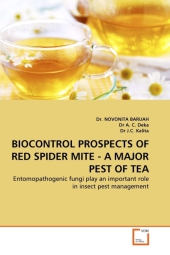 Neuerscheinungen 2011Stand: 2020-01-07 |
Schnellsuche
ISBN/Stichwort/Autor
|
Herderstraße 10
10625 Berlin
Tel.: 030 315 714 16
Fax 030 315 714 14
info@buchspektrum.de |

Novonita Baruah, A. C. Deka, J. C. Kalita
(Beteiligte)
BIOCONTROL PROSPECTS OF RED SPIDER MITE - A MAJOR PEST OF TEA
Entomopathogenic fungi play an important role in insect pest management
2011. 224 S.
Verlag/Jahr: VDM VERLAG DR. MÜLLER 2011
ISBN: 3-639-33665-8 (3639336658)
Neue ISBN: 978-3-639-33665-8 (9783639336658)
Preis und Lieferzeit: Bitte klicken
Tea is one of the most important industrial crops having been export potentiality and the State Assam occupies the first position in terms of area and production. The intensive monoculture of a perennial crop like tea over an intensive area has formed a stable tea ecosystem which provided unlimited opportunity for perpetuation and spread of many endemic as well as exotic pests commensurate with gradual expansion of tea plantation in this region. Moreover, management factors like the uses of fertilizer and agro-chemicals are also believed to have a marked effect on the incidence of pests. Pesticides use in tea increases the risk of pesticide residue build up in made tea above the maximum residue limits. In biological control system a natural biotic force helps to regulate populations of insects. Conservation of native entomopathogen, augmentation, manipulation and if possible, introduction of exotic biotic agents help the tea crop to reduce the pesticidal load. Considering the need for an alternative eco-friendly approach to control the red spider mite of tea, it was believed to be worthwhile to screen the indigenous entomopathogenic fungal pathogens.
Biological control is one of the viable eco-friendly pest management strategy being explored. Use of entomopathogenic fungi for the purpose of insect pest management is the best alternative to the use of chemical pesticides.


